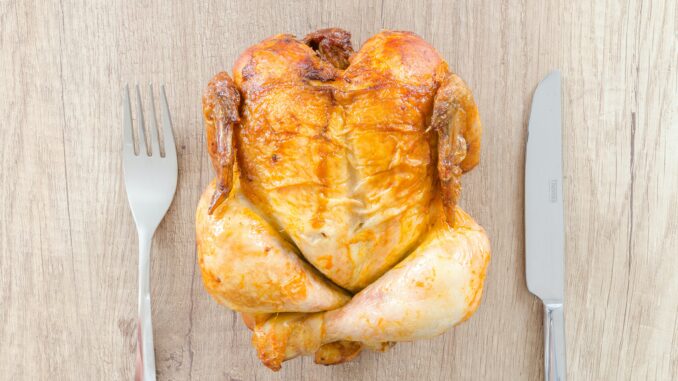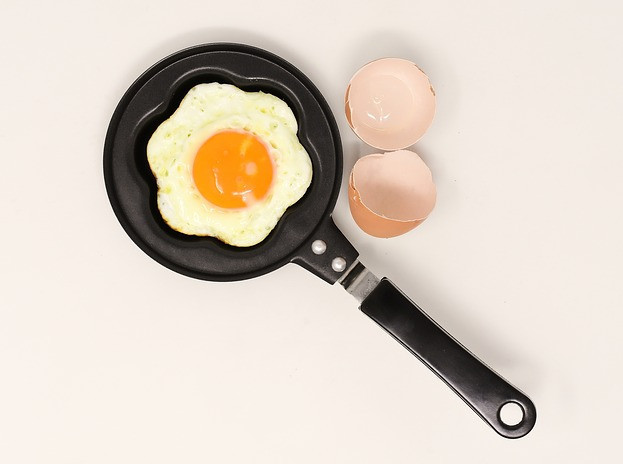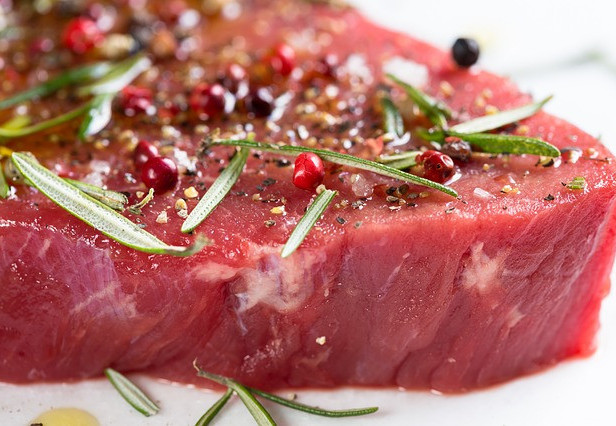
Every dieter knows that eating protein is important in order to build muscle and burn fat. It is a vital nutrient that affects your health and how you feel. But you may still be wondering “how much protein should I eat daily?”
Overall, opinions do tend to differ with regard to amounts. So, let’s dive deeper into the topic to help you find out the right amount of protein to fit your lifestyle.
Protein and Its Importance
Protein is a key macronutrient in the diet that helps your body in many ways. For example, it is essential to have enough protein for building muscle mass in the body.
However, proteins are also used to make other important things like: hormones, skin, neurotransmitters in the brain, molecules and enzymes.
We require protein to  help repair and build things in our bodies. As it is broken down in the body it also helps provide energy to muscles, fuels the metabolism and keeps us full.
help repair and build things in our bodies. As it is broken down in the body it also helps provide energy to muscles, fuels the metabolism and keeps us full.
Adequate sources of protein include animal products, nuts and legumes.
Amino acids are the smaller molecules that make up proteins. Our bodies do not make all the necessary amino acids. In fact, there are 9 amino acids that the body cannot make on its own.
Therefore, they must be eaten through other things in the diet. These 9 amino acids that we do not make are called essential amino acids and must be eaten through our food intake.
Most complete protein can be eaten via animal sources because their tissues are similar to ours. However, if you are vegetarian or vegan, you may be missing out on some of these essential amino acids.
These specific diets require more attention with regards to protein values.
Factors That Affect Our Protein Requirements
There are a variety of things that can affect the amount of protein that you may require. Consider the following:
- your age
- level of daily activity
- overall health
- your diet
Depending on these factors, you will require differing amounts of daily protein. For example, it makes sense that a young man that is physically active each day would require more protein than an elderly, sedentary person.
Guidelines For Protein
The Dietary Reference Intake (DRI) recommendation for protein consumption based on body weight is 0.36 grams per pound. For a sedentary man, that would equal approximately 56 grams of protein per day (at a weight of 160 lbs) and 46 grams for a sedentary woman (130 lbs).
However, there are other guidelines such as the Institute of Medicine that recommend a slightly different amount. They suggest that protein should make up 10-35% of the daily adult diet, based on 2,000 calories per day.
That would roughly be 200-700 calories per day in protein. Another way to look at it would be approximately 54 grams of protein for a 150 lb woman and 65 grams of protein for a 180 lb man.
But these amounts are on the low end of the spectrum.
You can see that average body weights differ between these 2 national guidelines. So based on your sex, your level of activity, your age and your overall health, protein requirements will be not be the same for everyone.
These amounts may still be too little for someone who is active or consciously trying to lose weight. Not eating enough protein can leave you feeling tired and hungry.
Protein For Weight Loss
The basic idea behind losing weight is to eat fewer calories than you burn off. And eating  enough protein can help you to achieve your weight loss efforts.
enough protein can help you to achieve your weight loss efforts.
A high protein diet is one of the best ways that science is showing can help boost your metabolic rate. That means you can more efficiently burn calories.
In addition, adding protein is an effective way to keep you feeling full longer while slowing hunger. Obviously, when you eat less, you consume fewer calories.
There is evidence to show that eating protein in significant amounts can boost metabolism by 80-100 calories extra per day over eating less protein.
Eating protein can keep hunger at bay. When you are less hungry, you will eat less. So this can help you in terms of losing extra weight.
Another benefit to eating protein is that it may help you from regaining lost weight. Plus, eating adequate amounts of protein will help you from losing muscle mass. Muscle is very important to keep calories burning naturally all day long.
In the end, eating protein can help you to:
- feel satiated
- reduce appetite
- help build muscle
- boost metabolism
- provide energy
- help prevent you from regaining lost weight
Protein is a helpful nutrient to be aware of if you are trying to shed pounds.
When Should I Eat Protein?
In North America, it is extremely common for people to eat less protein at the beginning of the day and then end the day with the bulk of their protein. New research is discovering that this may not be ideal.
Dividing protein consumption up evenly throughout the day may actually help support your muscles better. It may also help keep your internal metabolic rate burning consistently all day long.
There are many ways you can naturally help boost your metabolism.
One study from the Journal of Nutrition found that eating 30 grams of protein at each mealtime helped muscle development by 25% over those who took their main protein at dinnertime. When you build better muscle mass, you burn more calories.
Therefore, eating more protein can help keep your muscles strong. This helps your metabolism. As a result, it can be easier to lose weight with an increased metabolism.
Examples of What 10 grams of Protein Looks Like
Some of the best sources of protein come from animal sources. Things like beef, chicken, pork, fish and seafood are all examples. Other sources include eggs, dairy, nuts and legumes.
Let’s look at some simple examples of what 10 grams of protein might look like:
- 1 cup of cooked quinoa
- 2 small eggs
- 2 oz. serving of trail milx
- 1/2 cup of Greek yogurt
- 2.5 tbsp of peanut butter
- 1/4 cup of tuna
- 1/3 cup of cottage cheese
- 1 protein bar (many have 6-20 grams protein per bar)
- 2 oz. pumpkin seeds
- 1 protein shake (most shakes offer at least 20 grams per scoop)
- 3/4 cups of edamame
Other Conditions Affecting Protein Levels
Extra protein is needed during pregnancy to help both the mother and assist the baby’s development. It is important for tissue repair and growth of the baby. Protein is especially important if you are breastfeeding.
People that are physically active also have higher requirements for protein over those who are sedentary. If you have a job that requires physical strength or you exercise regularly, you might need to bump up your protein.
Elderly adults may also not be getting enough protein in their diets. One study showed that requirements might actually be 50% higher than those amounts recommended by the DRI. Protein has also been found to help bone health, especially when paired with calcium intake.
It is also important to be conscious of your protein intake if you are recovering from injuries or illness.
Is Too Much Protein Harmful?
Of course eating only protein will mean that you will miss out on other beneficial nutrients like fiber and healthy fats. Diets such as Keto, that promote mainly protein as the staple in the diet can be beneficial for weight loss. However, lack of fiber and other macronutrients may become an issue.
High protein diets that revolve around cutting out beneficial carbohydrates and healthy fats may cause health issues. They can lead to deficiencies in fiber and nutrition, headaches, constipation and kidney problems for those who already have kidney disease.
There have been some people saying that too much protein can cause osteoporosis. But the evidence is not there to support that argument.
Experts are suggesting that the average North American is already getting enough protein. However, the goal should be to spread the intake evenly throughout the day.
Overall, it appears that a reasonably high protein intake does not have any adverse effects on healthy people.
Ways To Get Protein
The best sources of complete protein are found in eating meat, dairy, fish and eggs. They contain the 20 essential amino acids that your body needs for good health.
Proteins can also be found in plant-based foods like nuts, legumes, tofu and quinoa. These are choices often made by vegetarians or vegans.
People that are healthy, don’t usually need to supplement their protein levels, assuming they are already eating from a wide variety of sources. Therefore, it’s generally not necessary to keep track of the amount of protein you are consuming.
Try to eat quality protein from various sources with all of your meals throughout the day. Eating protein-rich foods, whether you’re a meat-eater or a vegetarian, will give your body the fuel it needs for healthy muscles and long-term energy.
Eating Protein Final Thoughts
Protein is a key nutrient that your body requires for good health. It can be found in many food sources that are animal and plant-based.
Variety is the spice of life. So aim to get quality, lean proteins spread out at each mealtime for the best health and weight loss benefits. Aim to make 30% of your meals protein-based.
If you are already eating a healthy, balanced diet then you are probably getting adequate protein. However, if you are active, pregnant, breastfeeding or elderly, you may require even more protein each day.
Whether you want to lose weight, build muscle or both, eating protein can help you achieve those goals. It is a critical component to any healthy diet.
Affiliate Disclosure: The links in this review may result in a small commission should you decide to buy at no additional cost to you. This goes toward supporting researching, writing and maintenance of this website. We only recommend the highest quality products.
Disclaimer: The information on this website is not intended to be a substitution for the advice of a licensed, medical professional. Always consult with your doctor before purchasing any health supplement, especially if you are taking medication or have a medical condition. These products are not intended to diagnose, treat, cure or prevent any disease. Individual results may vary and these statements have not been evaluated by the FDA.

Thank You for Sharing
I have enjoyed reading your article on Protein. I have learned a lot of things that I did not know about especially why I should or should not eat protein every day.
I know now what to eat to stay fuller for longer. I have diabetics and always feel hungry, by eating protein foods I stay full longer and don’t feel hungry all the time.
I have also learned that we need to maintain muscle mass and eat protein so we do not put on the weight we lost.
Most things you mention I can eat even I have diabetes. Thank you for enlightening me about protein.
Elke
Glad you enjoyed reading the article, Elke. Protein is a very important part of the diet that a lot of people don’t pay enough attention to. This is especially important for diabetics. Thanks for commenting and dropping by!